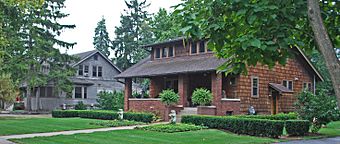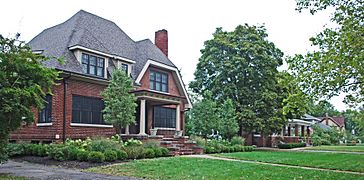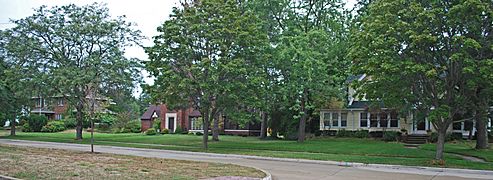Pleasant Ridge Historic District facts for kids
|
Pleasant Ridge Historic District
|
|
 |
|
| Location | Roughly bounded by Millington Rd., Woodward Ave., and the city limits of Royal Oak, Huntington Woods, Oak Park, and Ferndale, Pleasant Ridge, Michigan |
|---|---|
| Area | 85 acres (34 ha) |
| Architect | Albert Kahn, Et al. |
| Architectural style | Colonial Revival, Bungalow/craftsman, Tudor Revival, Late 19th And Early 20th Century American Movements |
| NRHP reference No. | 92000165 (original) 10001024 (increase) |
Quick facts for kids Significant dates |
|
| Added to NRHP | August 11, 1992 |
| Boundary increase | December 13, 2010 |
The Pleasant Ridge Historic District is a special neighborhood in Pleasant Ridge, Michigan. It is known for its many old homes. This area was added to the National Register of Historic Places in 1992. This means it is a place important to the history of the United States.
The first part of the district was west of Woodward Avenue. It went from Millington Road to the city limits of Ferndale. In 2010, the district got bigger. It now includes areas west of Ridge Road. This expanded area reaches the city limits of Royal Oak, Huntington Woods, Oak Park, and Ferndale.
Contents
History of Pleasant Ridge Homes
The land where this district now stands was once a farm. It belonged to a man named Virgil Rose. He ran a tavern on Woodward Avenue from the 1840s to 1880. In 1885, Virgil Rose lost this part of his farm.
How the Neighborhood Started
By 1894, a lawyer named Alfred F. Wilcox bought the land. He built his own house on Woodward Avenue. In 1906, he started dividing the farm into smaller pieces. These pieces were for building houses. This process is called "platting." The first lots were along what is now Ridge Road. More areas were divided in the 1910s and 1920s.
Building the Community
Many of the land sales and house constructions were done by a few companies. The Walter Gehrke Company was one of the main ones. They helped make the neighborhood quiet and residential. This means it was a peaceful place mainly for homes.
Who Lived Here Early On
The first people to live in Pleasant Ridge were successful professionals. They were not super rich, but they had good jobs. These included doctors, lawyers, and professors. Some notable residents were:
- Fred H. Johnson, a company president.
- Rev. Edgar Dewitt Jones, a church pastor.
- Dr. Edward J. Martin, a science expert at General Motors.
- Dr. Ben Goodrich, a doctor at Henry Ford Hospital.
- Dr. Myra Babcock, a doctor at Grace Hospital.
- Ernest Fletcher, who was the Mayor of Pleasant Ridge.
- Louis H. Fead, a former Chief Justice of the Michigan Supreme Court.
What Makes the District Special
The Pleasant Ridge Historic District is mostly made up of houses. Most of these homes were built between 1910 and 1930. They show many different styles of architecture.
Architectural Styles You Can See
Many houses are built in "historical revival" styles. This means they look like older types of buildings. Some examples are:
- Colonial style
- English Tudor style
- Dutch Colonial style
- English Cottage style
- French Eclectic style
- Spanish Colonial style
You can also find homes in the Arts and Crafts style. This includes Craftsman and Prairie School types. These styles focus on natural materials and simple designs.
How Many Historic Buildings
The original part of the district has 181 buildings. Out of these, 151 are important to the neighborhood's history. The part added in 2010 has 340 more buildings. Of these, 326 are important to the historical character.
Gallery
 | Bessie Coleman |
 | Spann Watson |
 | Jill E. Brown |
 | Sherman W. White |





